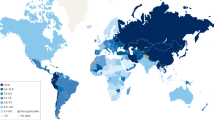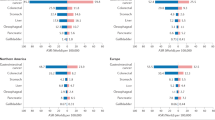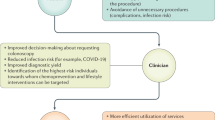Abstract
Gastroenterology lags behind other specialties such as cardiology in the quality of its evidence base for clinical practice. One area where this is particularly evident is in cancer prevention, despite developments in chemoprevention strategies for high-risk patients. For chemoprevention strategies to be successful, we need appropriate clinical networks and translational science infrastructures, model chemoprevention agents and multiple, large, flexible and randomized clinical trials. Translational science must also be embedded into large-scale, long-term, randomized clinical trials that have hard endpoints, so that irrefutable evidence of the longevity of treatment efficacy can be gathered. We also need to be able to identify an individual's cancer risk using valid global patient populations, so that medical benefits can be applied to all, regardless of ethnicity, sex, economic status, age and comorbidities. The future success of gastrointestinal chemoprevention relies on fostering a closer link between basic pharmaceutical research and clinical applications, in a 'bench to bedside and back' manner. In this review we systematically assess the evidence for various cancer prevention strategies, especially chemoprevention, and highlight the obstacles to further exploitation of this knowledge base.
Key Points
-
The incidence of gastroesophageal cancer is increasing and the prognosis is not improving, especially for esophageal adenocarcinoma
-
Cancer prevention through screening and surveillance is unproven and not cost effective
-
Chemoprevention is unproven but shows promise, especially as several efficacious and tolerated agents are available to test
-
Bottlenecks to mass chemoprevention trials include undeveloped translational networks, rudimentary pharmacogenetics and conservative trial designs
-
The future holds promise for a combined therapy for chemoprevention and cardiac protection
This is a preview of subscription content, access via your institution
Access options
Subscribe to this journal
Receive 12 print issues and online access
$209.00 per year
only $17.42 per issue
Buy this article
- Purchase on Springer Link
- Instant access to full article PDF
Prices may be subject to local taxes which are calculated during checkout

Similar content being viewed by others
References
Levin B et al. (2002) Promoting early detection tests for colorectal carcinoma and adenomatous polyps: a framework for action: the strategic plan of the National Colorectal Cancer Roundtable. Cancer 95: 1618–1628
Jankowski J and Moayyedi P (2004) Re: cost-effectiveness of aspirin chemoprevention for Barrett's esophagus: J Natl Cancer Inst 96: 885–887
Lafata J et al. (2004) The economic impact of false-positive cancer screens. Cancer Epidemiol Biomarkers Prev 13: 2126–2132
Wulfkuhle JD et al. (2003) Proteomic applications for the early detection of cancer. Nat Rev Cancer 3: 267–275
Lippman SM et al. (2004) Cancer prevention and the American Society of Clinical Oncology. J Clin Oncol 22: 3848–3851
Hawk E and Viner JL (2005) The critical role of risk-benefit assessments in cancer prevention. Cancer Epidemiol Biomarkers Prev 14: 297–298
Jankowski J and Boulton E (2005) Cancer prevention. BMJ 331: 618
Calle EE and Kaaks R (2004) Overweight, obesity and cancer: epidemiological evidence and proposed mechanisms. Nat Rev Cancer 4: 579–591
Key TJ et al. (2004) Diet, nutrition and the prevention of cancer. Public Health Nutr 7: 187–200
Blot WJ et al. (1993) Nutrition intervention trials in Linxian, China: supplementation with specific vitamin/mineral combinations, cancer incidence, and disease-specific mortality in the general population. J Natl Cancer Inst 85: 1483–1492
Mark SD et al. (2000) Prospective study of serum selenium levels and incident esophageal and gastric cancers. J Natl Cancer Inst 92: 1753–1763
Terry P et al. (2001) Fruit, vegetables, dietary fiber, and risk of colorectal cancer. J Natl Cancer Inst 93: 525–533
Gann, PH et al. (1993) Low-dose aspirin and incidence of colorectal tumors in a randomized trial. J Natl Cancer Inst 85: 1220–1224
Bingham SA et al. (2003) Dietary fibre in food and protection against colorectal cancer in the European Prospective Investigation into Cancer and Nutrition (EPIC): an observational study. Lancet 361: 1496–1501
Hawk ET et al. (2005) Can animal models help us select specific compounds for cancer prevention trials? Recent Results Cancer Res 166: 71–87
Green JE and Hudson T (2005) The promise of genetically engineered mice for cancer prevention studies. Nat Rev Cancer 5: 184–198
Anderson M and Jankowski J (2004) Management of oesophageal adenocarcinoma—control of acid, bile and inflammation in intervention strategies for Barrett's oesophagus. Aliment Pharmacol Ther 20 (Suppl 5): S71–S80
Benamouzig R et al. (2003) Daily soluble aspirin and prevention of colorectal adenoma recurrence: one-year results of the APACC trial. Gastroenterology 125: 328–336
Baron JA et al. (2003) A randomized trial of aspirin to prevent colorectal adenomas. N Engl J Med 348: 891–899
Sandler RS et al. (2003) A randomized trial of aspirin to prevent colorectal adenomas in patients with previous colorectal cancer. N Engl J Med 348: 883–890
Bigler J et al. CYP2C9 and UGT1A6 genotypes modulate the protective effect of aspirin on colon adenoma risk. Cancer Res 61: 3566–3569
Tsao AS et al. (2004) Chemoprevention of cancer. CA Cancer J Clin 54: 150–180
Luciani F et al. (2004) Effect of proton pump inhibitor pretreatment on resistance of solid tumors to cytotoxic drugs. J Natl Cancer Institute 96: 1702–1713
Olbe L et al. (2003) A proton-pump inhibitor expedition: the case histories of omeprazole and esomeprazole. Nat Rev Drug Discov 2: 132–139
Bresalier RS et al. (2005) Cardiovascular events associated with rofecoxib in a colorectal adenoma chemoprevention trial. N Engl J Med 352: 1092–1102
Dieppe PA et al. (2004) Lessons from the withdrawal of rofecoxib. BMJ 329: 867–868
Wong BC et al. (2004) Helicobacter pylori eradication to prevent gastric cancer in a high-risk region of China: a randomized controlled trial. JAMA 291: 187–194
Malfertheiner P et al. (2005) Helicobacter pylori eradication has the potential to prevent gastric cancer: a state-of-the-art critique. Am J Gastroenterol 100: 2100–2115
Rothenberg ML et al. (2003) Improving the evaluation of new cancer treatments: challenges and opportunities. Nat Rev Cancer 3: 303–309
Ferry DR et al. (2004) Phase II trial of gefitinib (ZD1839) in advanced adenocarcinoma of the oesophagus incorporating biopsy before and after gefitinib [abstract]. J Clin Oncol 22 (Suppl 14S): a4021
Pepe MS et al. (2001) Phases of biomarker development for early detection of cancer. J Natl Cancer Inst 93: 1054–1061
Ransohoff D. Rules of evidence for cancer molecular-marker discovery and validation. Nat Rev Cancer 2004 4: 309–314
McShane LM et al.: Reporting recommendations for tumor marker prognostic studies. J Clin Oncol, in press
Ulrich CM et al. (2003) Cancer pharmacogenetics: polymorphisms, pathways and beyond. Nat Rev Cancer 3: 912–920
Longley DB and Johnston PG. (2005) Molecular mechanisms of drug resistance. J Pathol 205: 275–292
Ponder B (2001) Cancer genetics. Nature 411: 336–341
El-Omar EM et al. (2003) Increased risk of noncardia gastric cancer associated with proinflammatory cytokine gene polymorphisms. Gastroenterology 124: 1193–1201
Peto J (2001) Cancer epidemiology in the last century and the next decade. Nature 411: 390–395
Pirmohamed M et al. (2004) Adverse drug reactions as cause of admission to hospital: prospective analysis of 18 820 patients. BMJ 329: 15–19
Simon R and Maitournam A (2004) Evaluating the efficiency of targeted designs for randomized clinical trials. Clin Cancer Res 10: 6759–6763
Sasaki H et al. (1998) Presence of Streptococcus anginosus DNA in esophageal cancer, dysplasia of esophagus and gastric cancer. Cancer Res 58: 2991–2995
Rembacken BJ et al. (1999) Non-pathogenic Escherichia coli versus mesalazine for the treatment of ulcerative colitis: a randomized trial. Lancet 354: 635–639
Burns AJ and Rowland IR (2004) Antigenotoxicity of probiotics and prebiotics on faecal water-induced DNA damage in human colon adenocarcinoma cells. Mutat Res 551: 233–243
Bauer P and Brannath W (2004) The advantages and disadvantages of adaptive designs for clinical trials. Drug Discov Today 9: 351–357
Yamashita YM et al. (2003) Orientation of asymmetric stem cell division by APC tumor suppressor and centrosome. Science 301: 1547–1550
Giardiello FM et al. (1993) Treatment of colonic and rectal adenomas with sulindac in familial adenomatous polyposis. N Engl J Med 328: 1313–1316
Gillies D (2005) Hempelian and Kuhnian approaches in the philosophy of medicine: the Semmelweis case. Stud Hist Philos Biol Biomed Sci 36: 159–181
Acknowledgements
We would like to thank Professor Doug Altman and Professor Adrian Harris of Cancer Research UK and Professor David Kerr as well as Dr Raghib Ali of Oxford University for their helpful comments and suggestions during the preparation of this manuscript. JA Jankowski receives funding from Cancer Research UK, the National Cancer Research Institute, UK, University of Oxford, UK and University Hospitals of Leicester, UK. ET Hawk receives funding from the National Cancer Institute, USA.
Author information
Authors and Affiliations
Corresponding author
Ethics declarations
Competing interests
JA Jankowski is supported in part by educational grants from several pharmaceutical companies and is funded by Cancer Research UK. He also holds the deputy chair of the NCRI translational science group.
Rights and permissions
About this article
Cite this article
Jankowski, J., Hawk, E. A methodologic analysis of chemoprevention and cancer prevention strategies for gastrointestinal cancer. Nat Rev Gastroenterol Hepatol 3, 101–111 (2006). https://doi.org/10.1038/ncpgasthep0412
Received:
Accepted:
Issue Date:
DOI: https://doi.org/10.1038/ncpgasthep0412
This article is cited by
-
Aspirin therapy for cancer: it is never too late
British Journal of Cancer (2011)
-
Biomarkers in Gastroenterology: Between Hope and Hype Comes Histopathology
The American Journal of Gastroenterology (2009)
-
Medikamentöse Prävention gastrointestinaler Tumoren
Der Internist (2006)



